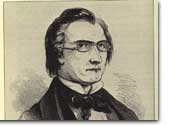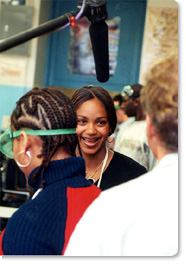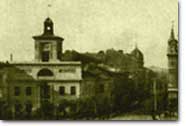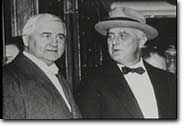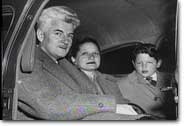
![]()
 |
UNNATURAL CAUSES: IS INEQUALITY MAKING US SICK? For Vital Pictures and California Newsreel Learn more at www.unnaturalcauses.org. |
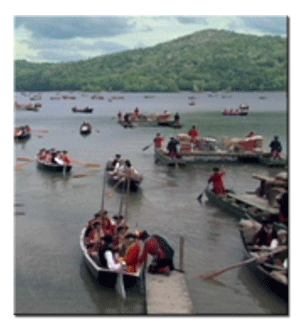 |
THE WAR THAT MADE AMERICA |
MURDER AT HARVARD American Experience on PBS |
|
A MURDER MOST FOUL... Edmund Pearson, the historian of homicide, called it "America's most celebrated murder." Edward Everett, a president of Harvard, said it was "the most painful event in our domestic history." When Charles Dickens visited Boston one of his first requests was to see "the room where Dr. Parkman was murdered." Even by today's numbingly sensationalist standards, the grisly tale is disturbing. It happened in November 1849 when Dr. George Parkman, a physician and scion of one of Boston's richest families, was allegedly beaten to death and dismembered by a Harvard professor of chemistry named John Webster. A week after Parkman's disappearance, the janitor of the Harvard Medical School discovered body parts dispersed about Webster's laboratory. Webster was put on trial in a spectacle that drew tens of thousands of on-lookers, as well as journalists from as far away as Europe. Webster was convicted and hanged. But his guilt is one of many uncertain details which have confounded those attempting to tell the story of the Parkman case for the past 150 years. MURDER AT HARVARD, a one-hour TV documentary and Web site, examines different accounts of this infamous crime as an entertaining vehicle through which to analyze varieties of historical presentation. With historian SIMON SCHAMA (author of Death of a Harvard Man - an account of the murder) as our guide, we will demystify the work of historical storytellers, and in the process, uncover how the decisions they make affect the way the rest of us perceive the past. In an age when many people receive their knowledge of the past from popular media, this documentary provides audiences tools with which to better understand the uses-and potential abuses-of historical genres, from traditional works of history to popular entertainment. Produced in association with the Center for Independent Documentary. |
|
|
A DAY IN THE LIFE OF THE JEREMIAH E. BURKE Broadcast on WGBH April 2002 |
|
ZAMIR: JEWISH VOICES RETURN TO POLAND Showing on PBS, Autumn 2000. In 1899, in the city of Lodz, Poland, a new musical sound was heard-- the first Jewish community choral ensemble, whose voices embodied the richness and passion of the Jewish culture of Eastern Europe. It called itself Hazomir, and for three decades it was at the core of a Jewish cultural movement that flourished throughout Europe. |
Today, 100 years after its founding, Zamir is back. In June of 1999, the 50-member Zamir Chorale of Boston, now celebrating its 30-year anniversary, made a commemorative tour of Eastern Europe to perform in the places where the Zamir movement began. ZAMIR: THE SONGS LIVE ON (working title), a one-hour documentary, will celebrate this emotional journey to the once-vibrant capitals of Jewish and Yiddish culture. With performances in Lodz, Warsaw, Cracow, Prague, and Vienna- and at the somber sites of two concentration camps- this film will recount a remarkable journey of music and memory that will be both joyous and contemplative- deeply personal and universally appealing. Far more than a concert film, ZAMIR will be an illuminating expedition into the history of Jewish culture before the Holocaust. Evocative archival footage and photos will help bring to life the streets, parks and concerts halls that once rang with Jewish music, while interviews with survivors will tell the colorful and compelling cultural history of which the Hazamir movement was an integral part. For Jews and non-Jews both, this film's variety of sites, stories, historical footage and photos will provide an eye-opening account of Jewish life that will enrich understanding and help defeat prejudice. By the end of this journey, viewers of the film will have shared many of the personal moments of joy, sadness, and discovery that these singers experienced. ZAMIR: THE SONGS LIVE ON is a once-in-a-lifetime opportunity to bring together the old and the new Jewish life and culture in this century. Through the power of voices raised together, dark places will be illuminated and layers of history will be peeled away to celebrate the millions of lives and a vibrant culture that, though lost, will never be forgotten. ABOUT THE ZAMIR CHORALE OF BOSTON In its 30-year history the Zamir Chorale of Boston has performed throughout New England and New York, toured Israel and Great Britain, and appeared with the Jerusalem Symphony and Israel Philharmonic Orchestra, conductors Daniel Barenboim and Zubin Mehta, and soloists Theodore Bikel and Herschel Bernardi. Zamir has received consistent musical praise in both local and national media. Joshua R. Jacobson, founder and director of the Zamir Chorale of Boston, is Professor of Music and Director of Choral Activities at Northeastern University, where he is the Stotsky Professor of Jewish Studies. His articles on various aspects of choral music, and his compositions and arrangements, have been published and performed internationally. |
|
|
BROTHER, CAN YOU SPARE A BILLION? Produced and directed by Eric Stange |
A Tennessee farm boy who dropped out of school in the 8th grade, Jesse Holman Jones had made a fortune building Houston in the 1920s. When the crash came, he went to Washington to put his business skills to work for the government. As head of the Reconstruction Finance Corporation he became, according to journalists, "the second most powerful man in the nation." Under his leadership, the focus of financial power in the US shifted from Wall Street to Washington, and the government became a crucial partner in the business life of the nation‹a trend that has now been reversed by recent administrations. The film mixes interviews with evocative archival footage and personal stories to create a riveting portrait of a man who, although unknown to today's audience, had been called at one time "the fourth branch of government." |
|
ENGINEERING FROM THE INSIDE OUT |
|
LOVE IN THE COLD WAR |
|
|
CHILDREN OF THE LEFT |
PICKING UP THE PIECES: Episode 5 of Making Sense of the '60s |
|
CAN YOU STOP PEOPLE FROM DRINKING? |
|
THE LEMON SHARKS OF BIMINI |
|
THE DISCOVER MAGAZINE SHOW |
|
THE HEALTH QUARTERLY |
|
Other Projects |
|
| © All material copyright 2000-2005 Spy Pond Productions, Inc. • Site design by Korynn Rielly Kirchwey | |
